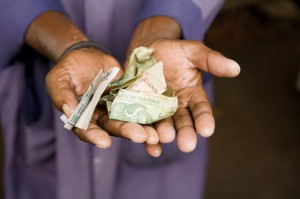Adaptation Fund
The UN Adaptation Fund: Securing funding, strengthening perspectives
The temporary “rescue” of the Adaptation Fund (AF) was one of the few bright spots of the United Nations climate change conference in Warsaw. Developing countries and many representatives of non-governmental organizations argued for additional pledges from developed countries. The fund is used to finance urgently needed projects aimed at helping developing countries to adapt to the harmful effects of climate change.
The AF is important not only because it is the first multilateral climate fund to grant developing countries direct access to financial resources, but also because it is aimed at supporting the most vulnerable people and communities in developing countries affected by climate change.
At its conception a few years ago, the Adaptation Fund was financed by an innovative source of funding – namely a share of proceeds from the Clean Development Mechanism (CDM). As a consequence of the insufficient climate protection targets set by the Kyoto member countries, however, the carbon price has plunged, drastically reducing the fund’s inflow, so that the focus has lately shifted back towards obtaining financial commitments from governments and identifying additional innovative funding sources. While Germany had previously paid into the AF just once (ten million euros in 2010), the German government now actively supported the fund, both before and during the Warsaw conference, in achieving its goal of obtaining an additional 100 million US dollars in funding. To this end, Germany contributed 30 million euros from the ministry of the environment’s budget.
The fresh money was put to immediate use: adaptation projects in the Seychelles, Myanmar, Cuba and Uzbekistan that had already been approved but were put on hold due to lack of financing could now receive the official go-ahead. While there are still approximately 100 million US dollars available for direct-access projects to be submitted by developing countries, a number of projects are on the verge of being approved. It is therefore apparent that the additional funding only represents a drop in the bucket, and the outlook for obtaining financing from carbon credits remains bleak. This has led the AF Board to adopt a new fundraising goal of 80 million dollars per year for both 2014 and 2015 at its most recent meeting.
At the top of the AF’s agenda for the immediate future is the further implementation of the projects approved in the past. These are increasingly approaching the time for interim evaluations, which should yield important findings regarding the actual benefits of the measures for the localities that are particularly affected by climate change. At the meeting, the AF Board also initiated the extensive review of the fund as a whole planned for this year. Initial findings are expected before the upcoming COP20 in Peru. Already, the fund’s experiences are increasingly shaping international discussions, such as the ongoing debate about the structure of the Green Climate Fund (GCF). The future relationship between the two instruments – whether the AF will take on the role of an implementing instrument for the GCF’s goals or eventually become a part of it – is still very much an open question.
The challenging discussions regarding the GCF do suggest that it is too early to put all the eggs into this one basket and that – at least during a transition period – the AF will continue to play an important role. Among other things, the principle that people and communities that are the most vulnerable to the effects of climate change warrant special attention has not yet been sufficiently established in the GCF framework.
The German government should, in addition to the development of the GCF, continue to strengthen the AF. An additional financial contribution (which has yet to be included in the new German budget) would help the AF to reach its new funding target. Now that Germany is one of the major contributors to the AF, it would also be time for it to join the AF Board.
Sven Harmeling, CARE International





